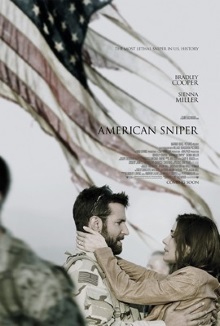
I hesitated a long time over whether or not to watch American Sniper. On the one hand, its cultural significance in the US cannot be overstated. On the other, I knew even without watching it that I would hate it. I only made up my mind when Tyler Cowen of Marginal Revolution called it the most important American film of 2014 though I still can’t decide if he was trolling when he called it one of the best anti-war films he’d ever seen.
As expected, I did indeed hate this right from start with Chris Kyle learning how to shoot from his father and the famous but ridiculous line about how everyone in the world is divided into sheep, wolves and sheepdogs. This film adaptation shows that Kyle enlisted in the military out of a desire to protect America and once deployed to Iraq he builds a reputation as a sniper of legendary skill. The most notable thing about him is his complete lack of hesitation to carry out the orders that he is given, even if it means shooting women and children. To be fair, it does show that he suffers from PTSD and has difficulty acclimating to peacetime life back in the US but he never sways from his conviction that what he does is righteous and that the US is the greatest country on Earth. At one point, he shockingly even claims that a fellow soldier died because that friend had wavered in his commitment.
This film disagrees with me on so many counts that it’s hard to decide where to begin. Even leaving aside the odious worldview in which Americans can do no wrong and that the lives of everyone else are worthless, a view that this film presents as plain, simple fact, there is plenty to talk about. First, there are the discrepancies between this film adaptation and its primary source, Kyle’s own memoir. I haven’t read the book myself but such is its prominence that it’s easy to find plenty of secondary accounts of it. Bradley Cooper plays Kyle as a humble and quiet man, yet Kyle seems to present himself as being an unapologetic braggart in his own book. In it, there’s even a widely reported anecdote about how at one point another American sniper was catching up to Kyle’s kill count and he expresses gratitude that at that point he managed to find enough targets to shoot at to keep his lead. Note also that villains like the Butcher and even the whole rivalry with the Syrian sniper were invented for the film and don’t play a role in the book.
Much else about the film offends common sense such that you don’t need to read the book to see how wrong it is. In one scene, Kyle watches the September 11 attacks on television and then we see him get deployed to Iraq as if the events are in any way connected. The World Trade Center towers came down in 2001 but the US invaded Iraq in 2003 to get rid of weapons of mass destruction that President Bush Jr. claimed was in the possession of Saddam Hussein. Not even the Bush administration claimed that Hussein was responsible for 9/11 and the film doesn’t mention Afghanistan at all. Then there’s all the silliness that precludes this from being a realistic depiction of military procedure. Kyle has a soldier assigned to watch his back but he’s such as awesome sniper that he doesn’t need a spotter? One Broken Forum regular who was a Marine deployed to Iraq remarked that he would be pissed if the sniper assigned on overwatch duty randomly decided to kick down doors instead of doing his job.
Director Clint Eastwood continues to insist that this is an anti-war film, in a similar vein to his previous works like Flags of Our Fathers and Letters from Iwo Jima. Indeed, there are scenes in American Sniper in which other characters are nonplussed by how unapologetic Kyle is about killing so many people. The film could almost have redeemed itself if the VA psychiatrist, upon hearing that Kyle feels no guilt whatsoever, had called him a psychopath as any sane person would conclude. But in the end Kyle is never seriously challenged by anyone and his status as a hero is never put in question. My own conclusion is that Eastwood wants to have it both ways: he wants the moral cover of being seen as anti-war but he also wants go after the acclaim and glory of America fighting a war that is just and righteous. Perhaps clever people like Cowen think that the fun is in tricking redneck Americans into liking a film that is ultimately anti-war but I find it impossible to believe that Eastwood is that sophisticated.
The vile politics aside, this still isn’t that good of a film. Cooper does do an interesting job of playing Kyle but everyone else is lackluster, probably because the film makes no effort of making them into real characters. As some commentators have pointed out, you actually get more of a backstory out of Mustafa, the rival sniper, than any of Kyle’s fellow soldiers. The action scenes look good and I suppose they avoid the mistake of making Kyle look like a superhero but run of the mill stuff that don’t feel particularly thrilling.
I don’t regret watching this because it’s important to know what’s going in American society. American Sniper was the highest grossing film of 2014 in America but as expected didn’t really do very well in overseas markets. Many of its fans seriously expected it to win big at the Oscars and were very upset when it didn’t. I think its success can be seen as a prescient and scary barometer of this year’s events: you can bet that every single one of Donald Trump’s supporters loved this film.
3 thoughts on “American Sniper (2014)”